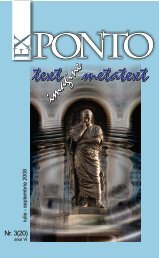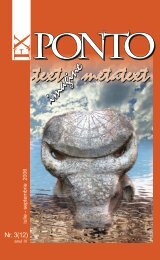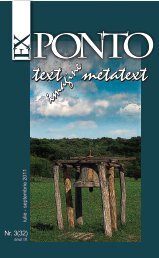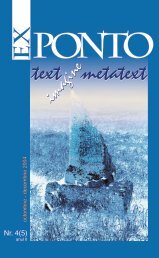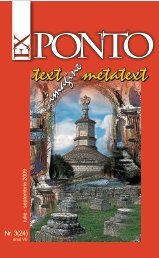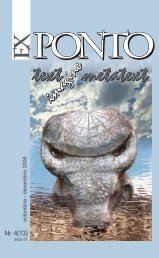Nr. 3 (28) anul VIII / iulie-septembrie 2010 - ROMDIDAC
Nr. 3 (28) anul VIII / iulie-septembrie 2010 - ROMDIDAC
Nr. 3 (28) anul VIII / iulie-septembrie 2010 - ROMDIDAC
Create successful ePaper yourself
Turn your PDF publications into a flip-book with our unique Google optimized e-Paper software.
person who shares the same temporal and spatial plane with her? Who in<br />
the world am I?” (SS: 170)<br />
The two women not only share this feeling of being divided into two<br />
separate selves, but they also experience a sense of lack, of something<br />
missing. While Sumire struggles to be a writer, she realizes she doesn’t<br />
possess that something needed to be a novelist. Miu, who also once longed to<br />
become a good pianist, was struck by the fact that other fellow pianists, whose<br />
technique was worse than hers, managed to move the audience, whereas<br />
she couldn’t: “Slowly but surely, though, I understood - that something was<br />
missing from me. Something absolutely critical, though I didn’t know what.”<br />
(SS: 168) The same idea was mentioned in South of the Border, West of the<br />
Sun, when Hajime could not indulge in Listz’s concerto even if played by an<br />
excellent pianist; technique is meaningless if it is not accompanied by warmth<br />
and if doesn’t help create a human connection. In fact, Sputnik Sweetheart<br />
is mostly about incompleteness and lack of communication; K loves Sumire,<br />
but she doesn’t like him in any sexual way. He has sexual relations with a<br />
neighbour whom he doesn’t love. Sumire loves Miu yet Miu can’t have sexual<br />
intercourse with her. As Toshio Kawai puts it, “everyone was like a Sputnik<br />
going around and passing by”. 16 Theirs is a world where people are zombienatured,<br />
where automatism feels much more natural than human bonding<br />
and where the old mythological panorama crashed.<br />
It is more than memory that Murakami investigates; it that deep monster<br />
within consciousness, that absolute “whatness” that forges our being and<br />
that is common to the archetypal soul which he stalks. At the core of all his<br />
novels lies this genuine Freudian curiosity, a curiosity that, however, goes<br />
beyond the mere observation of the mind. Identity issues, sexual repression,<br />
sleep and dream might seem the subject matters of a psychology treatise;<br />
Murakami transforms them into a treatise of the human soul. Trading in the<br />
footsteps of Proust, he likes to unwind the thread of memory, but somehow,<br />
an entanglement is always unavoidable. Little is left for explanations; there<br />
are only knots whose end is never to be found.<br />
Works Cited<br />
Baudrillard, Jean. Simulacra and Simulation. Trans. Sheila Faria Glaser. Ann<br />
Arbor: University of Michigan Press, 1994.<br />
Dil, Jonathan. “Woman as Symptom and the Void at the Heart of Subjectivity: A<br />
Lacanian Reading of Murakami Haruki’s ‘The Wind-up Bird Chronicle’ “. 30 Nov 2009,<br />
10 April <strong>2010</strong> < http://www.japanesestudies.org.uk/articles/2009/Dil.html><br />
Kawai, Toshio. “The novels of Haruki Murakami”. The Cultural Complex:<br />
Contemporary Jungian Perspectives on Psyche and Society. Eds. Thomas Singer,<br />
Samuel Kimbles. New York: Brunner-Routledge, 2004.<br />
Lane, Richard J. Jean Baudrillard. London and New York: Routledge, 2001.<br />
Luckhurst, Roger. “Mixing memory and desire: psychoanalysis, psychology and<br />
trauma theory”. Literary Theory and Criticism. Ed. Patricia Waugh. Oxford: Oxford<br />
University Press, 2006.<br />
Ex Ponto nr.3, <strong>2010</strong><br />
173






